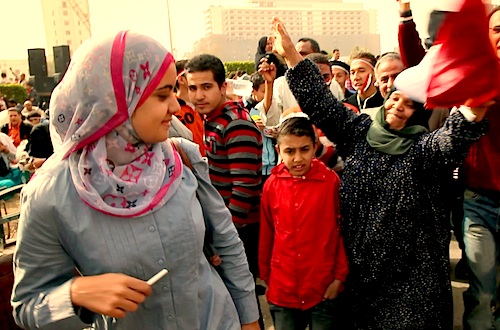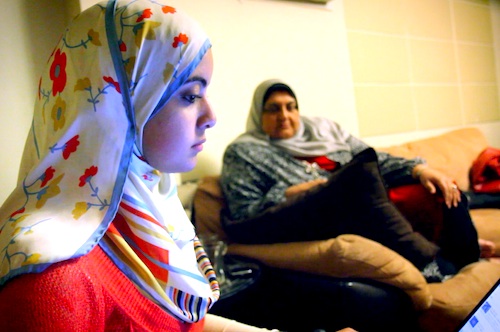[Editor’s Note: the post below appears today at The Huffington Post.]
By Govindini Murty. Egypt’s government announced on Sunday that an Islamist has won Egypt’s first competitive presidential election. The superb new documentary Words of Witness, screening at the Human Rights Watch Film Festival in New York through June 26th, sheds much needed light on how Egyptians got to this point. Directed by Mai Iskander, the film depicts the complex reality of an Egypt in which long-suffering citizens genuinely desire democracy, but must deal with the less than ideal reality of having to vote either for the Muslim Brotherhood or for remnants of the former Mubarak regime – with the military looming over any choice they might make.
Against this backdrop, Words of Witness makes the smart decision to focus its story on a young Egyptian woman, journalist Heba Afify. The documentary follows the 22 year-old Afify, a reporter for the English-language newspaper Egypt Independent, as she covers Egypt’s transition to democracy – from the heady days of the revolution in early 2011, through Egypt’s chaotic year and a half under military rule, to the recent months of buildup to Egypt’s first free presidential election. Completed in just the last few weeks, Words of Witness has a remarkable timeliness and immediacy in depicting the contending forces that are challenging Egypt’s journey to democracy.
Like her fellow citizens, Heba Afify finds herself torn between tradition and progress. Her traditional Muslim family worries about her career and her safety, while Afify’s chief concern is reporting the truth of the Egyptian revolution so that she may contribute to her nation’s democratic future.

As Afify poignantly says: “I can’t abide by the rules of being an Egyptian girl if I want to be a good reporter.” And if she can’t be a good reporter, the implication is that she can’t help her country, as a free press and democratic liberty go hand in hand. Afify adds, “It’s hard to live under a dictatorship – if you say the wrong thing, they will knock on your door and take you away forever.”
The film documents the remarkable degree to which Afify and other young Egyptians like her are willing to buck authority in order to bring about freedom and progress. It is her faith in these ideals that leads Afify to volunteer to cover the most dangerous demonstrations, despite the fears of her family. Afify’s conviction and her willingness to put her ideals on the line are what ultimately make her such a compelling protagonist.
In one extraordinary scene, Afify hears that there is a protest taking place outside the State Security headquarters. This is the home of the hated secret police who have been arresting (and reportedly torturing) thousands of pro-democracy activists. Even though it is nighttime, and reports indicate that the situation is dangerous, Afify doesn’t hesitate to join the demonstration. What follows is shocking footage, shot by Afify herself, in which the demure young woman dives right into the crowd of protesters in the dark – joining them as they break into the building. They’re hoping to free political prisoners, but as they turn on the lights in the building, they discover something even more surprising: boxes of surveillance files kept by the secret police on government employees, media, public figures, and countless ordinary Egyptians. A colleague of hers hands Afify boxes of files, saying “This happens only once in history, Heba.” Afify shakes her head at the magnitude of the surveillance, commenting: “The number of files is unbelievable.”
As Afify later examines the files in her office, she finds a transcript of an actress’ phone call; Afify wonders why the state police felt the need to write down every word of this woman’s personal phone conversation. As the film suggests, such an abuse of authority engenders a moral corrosion that is an important reason why authoritarian societies have such trouble adapting to freedom. It can take generations to overcome the cynicism, paranoia, and bad faith created by a system in which the government spends more time repressing its own people than in serving them.

Another important point made in the film is the need for religious tolerance. Afify shows concern when the unity between Muslims and Christians – that had largely prevailed in the early days of the revolution – breaks down in the wake of attacks on Christians. When a church is burned down in the village of Atfeeh, leading to riots in Cairo, Afify goes to the village herself to find out what has happened. When she gets to the village, she finds a curious scene – the kind of scene that often doesn’t make it into the Western media. A local Muslim leader addresses a large group of villagers, telling them that they should show support for their Christian brothers and work to have the church rebuilt. However, a large army presence watches the scene, and Afify is prevented from visiting the site of the church. Indeed, no-one is allowed to go near the church site, and the rumor ripples through the crowd that it is the State Security apparatus itself that burned the church down in order to inflame religious tensions in Egypt and justify the old regime hanging on to power.